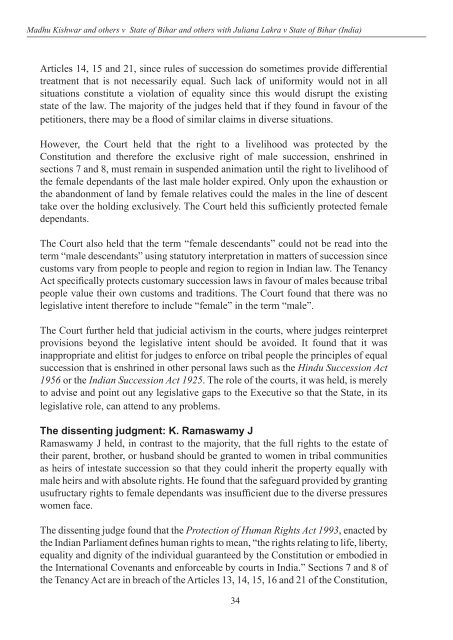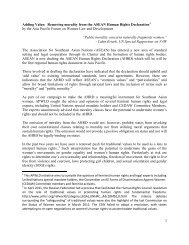A Digest of Case Law on the Human Rights of Women - Asia Pacific ...
A Digest of Case Law on the Human Rights of Women - Asia Pacific ...
A Digest of Case Law on the Human Rights of Women - Asia Pacific ...
Create successful ePaper yourself
Turn your PDF publications into a flip-book with our unique Google optimized e-Paper software.
Madhu Kishwar and o<strong>the</strong>rs v State <str<strong>on</strong>g>of</str<strong>on</strong>g> Bihar and o<strong>the</strong>rs with Juliana Lakra v State <str<strong>on</strong>g>of</str<strong>on</strong>g> Bihar (India)<br />
Articles 14, 15 and 21, since rules <str<strong>on</strong>g>of</str<strong>on</strong>g> successi<strong>on</strong> do sometimes provide differential<br />
treatment that is not necessarily equal. Such lack <str<strong>on</strong>g>of</str<strong>on</strong>g> uniformity would not in all<br />
situati<strong>on</strong>s c<strong>on</strong>stitute a violati<strong>on</strong> <str<strong>on</strong>g>of</str<strong>on</strong>g> equality since this would disrupt <strong>the</strong> existing<br />
state <str<strong>on</strong>g>of</str<strong>on</strong>g> <strong>the</strong> law. The majority <str<strong>on</strong>g>of</str<strong>on</strong>g> <strong>the</strong> judges held that if <strong>the</strong>y found in favour <str<strong>on</strong>g>of</str<strong>on</strong>g> <strong>the</strong><br />
petiti<strong>on</strong>ers, <strong>the</strong>re may be a flood <str<strong>on</strong>g>of</str<strong>on</strong>g> similar claims in diverse situati<strong>on</strong>s.<br />
However, <strong>the</strong> Court held that <strong>the</strong> right to a livelihood was protected by <strong>the</strong><br />
C<strong>on</strong>stituti<strong>on</strong> and <strong>the</strong>refore <strong>the</strong> exclusive right <str<strong>on</strong>g>of</str<strong>on</strong>g> male successi<strong>on</strong>, enshrined in<br />
secti<strong>on</strong>s 7 and 8, must remain in suspended animati<strong>on</strong> until <strong>the</strong> right to livelihood <str<strong>on</strong>g>of</str<strong>on</strong>g><br />
<strong>the</strong> female dependants <str<strong>on</strong>g>of</str<strong>on</strong>g> <strong>the</strong> last male holder expired. Only up<strong>on</strong> <strong>the</strong> exhausti<strong>on</strong> or<br />
<strong>the</strong> aband<strong>on</strong>ment <str<strong>on</strong>g>of</str<strong>on</strong>g> land by female relatives could <strong>the</strong> males in <strong>the</strong> line <str<strong>on</strong>g>of</str<strong>on</strong>g> descent<br />
take over <strong>the</strong> holding exclusively. The Court held this sufficiently protected female<br />
dependants.<br />
The Court also held that <strong>the</strong> term “female descendants” could not be read into <strong>the</strong><br />
term “male descendants” using statutory interpretati<strong>on</strong> in matters <str<strong>on</strong>g>of</str<strong>on</strong>g> successi<strong>on</strong> since<br />
customs vary from people to people and regi<strong>on</strong> to regi<strong>on</strong> in Indian law. The Tenancy<br />
Act specifically protects customary successi<strong>on</strong> laws in favour <str<strong>on</strong>g>of</str<strong>on</strong>g> males because tribal<br />
people value <strong>the</strong>ir own customs and traditi<strong>on</strong>s. The Court found that <strong>the</strong>re was no<br />
legislative intent <strong>the</strong>refore to include “female” in <strong>the</strong> term “male”.<br />
The Court fur<strong>the</strong>r held that judicial activism in <strong>the</strong> courts, where judges reinterpret<br />
provisi<strong>on</strong>s bey<strong>on</strong>d <strong>the</strong> legislative intent should be avoided. It found that it was<br />
inappropriate and elitist for judges to enforce <strong>on</strong> tribal people <strong>the</strong> principles <str<strong>on</strong>g>of</str<strong>on</strong>g> equal<br />
successi<strong>on</strong> that is enshrined in o<strong>the</strong>r pers<strong>on</strong>al laws such as <strong>the</strong> Hindu Successi<strong>on</strong> Act<br />
1956 or <strong>the</strong> Indian Successi<strong>on</strong> Act 1925. The role <str<strong>on</strong>g>of</str<strong>on</strong>g> <strong>the</strong> courts, it was held, is merely<br />
to advise and point out any legislative gaps to <strong>the</strong> Executive so that <strong>the</strong> State, in its<br />
legislative role, can attend to any problems.<br />
The dissenting judgment: K. Ramaswamy J<br />
Ramaswamy J held, in c<strong>on</strong>trast to <strong>the</strong> majority, that <strong>the</strong> full rights to <strong>the</strong> estate <str<strong>on</strong>g>of</str<strong>on</strong>g><br />
<strong>the</strong>ir parent, bro<strong>the</strong>r, or husband should be granted to women in tribal communities<br />
as heirs <str<strong>on</strong>g>of</str<strong>on</strong>g> intestate successi<strong>on</strong> so that <strong>the</strong>y could inherit <strong>the</strong> property equally with<br />
male heirs and with absolute rights. He found that <strong>the</strong> safeguard provided by granting<br />
usufructary rights to female dependants was insufficient due to <strong>the</strong> diverse pressures<br />
women face.<br />
The dissenting judge found that <strong>the</strong> Protecti<strong>on</strong> <str<strong>on</strong>g>of</str<strong>on</strong>g> <strong>Human</strong> <strong>Rights</strong> Act 1993, enacted by<br />
<strong>the</strong> Indian Parliament defines human rights to mean, “<strong>the</strong> rights relating to life, liberty,<br />
equality and dignity <str<strong>on</strong>g>of</str<strong>on</strong>g> <strong>the</strong> individual guaranteed by <strong>the</strong> C<strong>on</strong>stituti<strong>on</strong> or embodied in<br />
<strong>the</strong> Internati<strong>on</strong>al Covenants and enforceable by courts in India.” Secti<strong>on</strong>s 7 and 8 <str<strong>on</strong>g>of</str<strong>on</strong>g><br />
<strong>the</strong> Tenancy Act are in breach <str<strong>on</strong>g>of</str<strong>on</strong>g> <strong>the</strong> Articles 13, 14, 15, 16 and 21 <str<strong>on</strong>g>of</str<strong>on</strong>g> <strong>the</strong> C<strong>on</strong>stituti<strong>on</strong>,<br />
34



